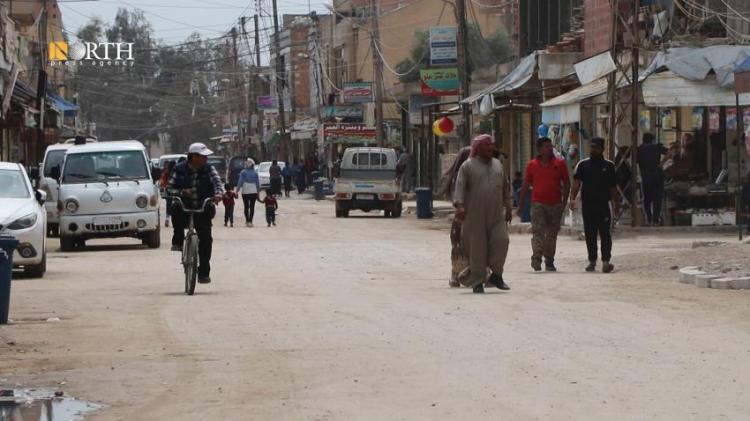Residents of Tal-Tamr complain about the tightening of lockdown measures
Hasakah – North-Press Agency
Delsoz Youssef
Residents in the town of Tal-Tamr, 40 km northwest of the city of Hasakah, expressed their lack of faith in the necessity of the strict precautionary measures imposed by the Autonomous Administration of North and East Syria, demanding to be allowed to open their stores and conduct their business. This comes a month after the imposition of the lockdown by the Autonomous Administration in all its regions to address the dangers of coronavirus.
The Internal Security Forces (Asayish) in the town of Tal-Tamr are tightening their security measures inside the town to impose the lockdown, and they closed the town's entrances except for emergency cases. They also closed the roads leading to the main markets and alerted the residents to stay at home and abide by the issued decisions, fining dozens of violators during the past period.
Sheikhmous Sino, who lives with an acquaintance in the Mount Abdulaziz (Kizwan) region since the Turkish army and its affiliated armed groups took control of his village in the northern countryside of Tal-Tamr, said that he was unable to reach Tal-Tamr since the announcement of the lockdown, which has him facing difficulties in obtaining the needs of his family.
“Life has become very difficult after the implementation of the strict security measures. This is the first time that I am entering the town after a month; we do not know where the situation will take us with the risks of coronavirus,” he added.
In turn, Sabri Muhammad, a popular artist from Tal-Tamr, said that prohibiting gatherings to prevent coronavirus has affected his work, as he was forced to stay at home. He believes that the decisions are too strict. “Coronavirus did not reach us and does not exist in our areas, it appeared a few months ago and went away, and now there is nothing. We will not be infected.”
The Health Ministry of the Syrian government has recorded 42 cases, including 3 deaths, to date, while no cases of coronavirus have been found in northeastern Syria so far.
However, on April 17, the World Health Organization (WHO) stated that Middle Eastern and North African region should still “seize the opportunity” and act to avoid a major spread of coronavirus.
“We have a chance to move in the region because the increase in cases has not been rapid so far,” Evan Hutton, director of the Department of Universal Health Coverage and Communicable Diseases of the WHO Eastern Mediterranean Office, told AFP.
Walid al-Abdullah, a radiologist in Tal-Tamr, criticized the closure of private clinics and laboratories because it led to overcrowding in the hospital, saying: “Most of the patients are residents of the villages, in this case there is serious pressure on the hospital as the patients gather inside.”
“The issue of coronavirus is not a joke, it must be taken very seriously, so we blame the concerned authorities for not taking the proper measures to deal with this sensitive phase, especially since most of the population responds to the decisions issued by the Autonomous Administration,” he also said.
On Tuesday, the Autonomous Administration announced the extension of the lockdown period for the second time until the beginning of May, with the return of the commercial activity, the opening of many stores, and the facilitation of agricultural work.

